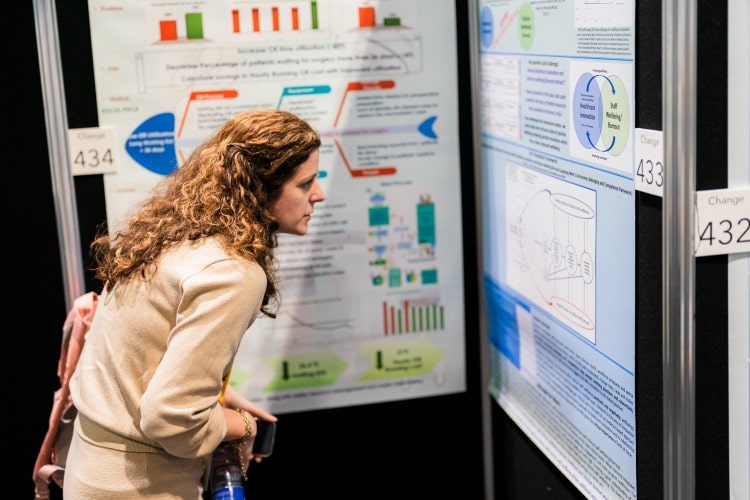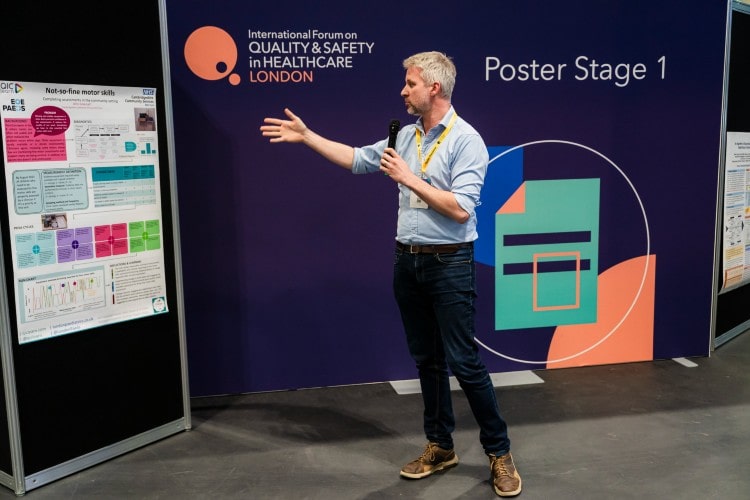Call for Posters is now closed, thank you for your submissions.
Guarantee your poster display in Utrecht
The International Forum poster displays represent the amazing work done on the ground to implement improvement, introduce change, and adapt problem-solving to real-life challenges. They showcase a wide range of improvement and safety projects implemented in local, national, or global settings—and yours can be one of them!
Displaying a poster effectively showcases your ideas, innovative approaches and strategies so others can learn from them. The various activities you can get involved in as a poster author (see below) will help you make connections, raise your profile and ultimately, contribute to our collective mission to better health and care.
Poster submission will close at midnight GMT on 11 November 2024 and results will be shared in December 2024. Poster authors must register by 9 April 2025 to guarantee inclusion in the onsite or virtual poster displays. Due to production timelines, accepted poster authors who wish their poster abstract to be included in the abstract supplement (see below) must register by 24 March 2025.
Promote your work during and after the conference
Don’t miss out on some of these opportunities to take your poster project well beyond the three days of the conference.
To help you demonstrate your ideas and work, we are introducing additional new opportunities to all our poster authors this year.
Networking and showcase opportunities at the International Forum
Scheduled poster presentation sessions (IMPROVED): Not three but six themed poster stages in the Exhibition Hall will host oral poster presentations. These will be integrated into the official programme and event guide, giving attendees advance notice of the poster sessions and a chance to pre-book their attendance, ensuring higher visibility and a larger audience. Running during morning breaks and lunchtimes on Day 2 and Day 3.
The expression of interest form will be emailed out after the Early Bird deadline of 19 March 2025. If you would like to present your Poster in Utrecht then please make sure your registration has been paid in full by this date. Presentation slots will be assigned on a first come first served basis
Online poster stage (online poster authors only): Showcase your poster project to peers by submitting a 5-minute recorded presentation. This presentation will be displayed on the conference virtual platform on either Day 2 and Day 3 of the conference. Live Q&A chat with online attendees about your project will also be available.
Topic-based meetups (NEW): Participate in facilitated discussions to exchange ideas, share insights, and connect with fellow poster authors who are working on similar projects. Running during afternoon breaks on Day 2 and Day 3.
Poster orientation: Meet other poster authors and get acquainted with the poster-related activities happening throughout the conference. Running during arrival refreshments on Day 2.
Poster walkaround: Poster authors will have the opportunity to discuss their abstracts in smaller groups, providing brief overviews and receiving feedback from peers on their projects. Running during arrival refreshments on Day 3.
1-2-1 mentoring sessions (NEW): These new mentoring sessions will pair less experienced authors with more seasoned ones for a peer-to-peer mentorship programme. Timings will shared at a later date.
Promotional and showcase opportunities after the International Forum
Abstract supplement (NEW): All accepted and registered posters will be published in the BMJ Open Quality digital journal, providing formal recognition of your work and ensuring it reaches a global audience. Accepted poster authors who wish for their poster abstract to be included in the abstract supplement must register by 24 March 2025.
LinkedIn author highlights (NEW): Select poster authors and their abstracts will be featured on the Healthcare Improvement at BMJ LinkedIn page after the conference. This spotlight is a fantastic opportunity to enhance your professional visibility and connect with a broader network in the healthcare improvement community.
Poster authors attending the International Forum in person will be invited to display their posters in a traditional printed format for display on a poster board. All poster authors, whether attending in person or virtually, will also be invited to create a digital ePoster, to be hosted on the International Forum app and virtual platform during and after the conference.
The poster topics
Our programme theme in Utrecht will be ‘From inspiration to impact: shaping the future of health and care‘. We will focus on great ideas but also on evidence-based plans for implementation and on innovative ways of working within teams and complex systems. We will highlight the importance of rigorous methodology and true collaboration between healthcare professionals and communities.
In the spirit of our programme theme, we want to hear about projects that discuss these fundamental principles. We would like the posters to show projects and initiatives with impactful results under six content streams: Safety, People, Populations, Change, Science, Leading.
Read more about each stream here.
Patient representation and lived experience
Submissions are expected to be co-produced with patients, service users, citizens and carers wherever possible. We have representatives on these groups in all our planning committees, and are working to increase the representation of these groups as speakers and delegates.
Where to print your Poster
We have partnered with a local printer in Utrecht to help you easily print and deliver your poster to Royal Jaarbeurs. Follow these steps to get your poster printed and delivered:
Order and pay for your Poster via Imago Prints
Go to the Imago Prints student posters webpage. Place your order and pay for your poster directly on the website.
Set the Delivery Details
Use Royal Jaarbeurs as the delivery address.
Select the option to pick up the posters in-store to avoid paying a shipping fee.
Add the Reference Code
In the order reference box, please ensure you enter the code Utrecht2024 so the printers can identify your order.
Notifying you
The results of poster submissions and information on the next steps will be sent out in December 2024.
Please note that the email address that you supply on the Submitter Details page when submitting your abstracts will be the email address used to correspond the results of your submission. If you change email addresses during this time, please let us know so we can update our system.




